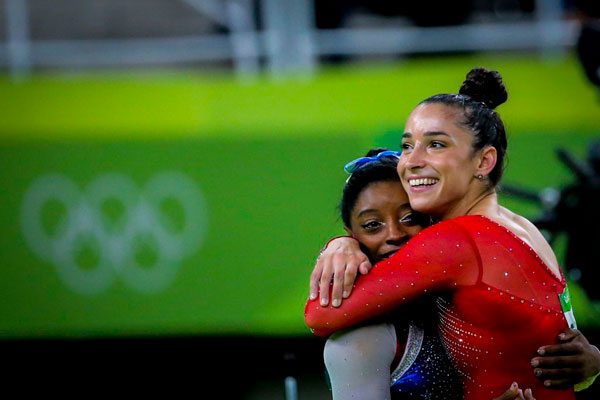
January 22, 2018; USA Today
Over days of harrowing victims impact statements, over 100 young athletes have testified to being sexually violated by a famous, institutionally sanctioned sports doctor. In many of their personal statements they also held two high-profile nonprofits and a university complicit in the situation: Team USA Gymnastics, the US Olympic Committee (USOC), and Michigan State University.
Team USA Gymnastics doctor Larry Nassar has already been given a 60-year sentence for charges related to child pornography, and he will receive an additional sentence based on the physical abuse of an estimated 140 girls and women who were driven, committed, competitive athletes, mostly in gymnastics. Among those abused were multiple members both of the 2012 and 2016 Olympic women’s gymnastics teams, including Alexandra Raisman, Jordyn Wieber, Gabby Douglas, McKayla Maroney, and Simone Biles. Many of the women said that their abuse at Nassar’s hands, disguised as “treatments,” started when they were twelve or even younger.
Complaints were reportedly made to MSU about Nassar in 1997, 1999, 2000, 2004, and 2014, but he was only finally held accountable in 2016 when the story broke in the media. Meanwhile, he acted as the women’s Olympic team doctor over four cycles of the Olympics. Underwriting it all was the fact that the two nonprofits provided the only real route to the Olympics.
Nassar will certainly go to prison for the rest of his life, but the women who testified—one after another, at a days-long victim impact hearing that’s worth watching for an image of strength and sisterhood—have major issues with what they describe as an enabling environment that did not provide them with safety, encouraged and sometimes mandated the use of this doctor, and then discouraged reporting.
We haven’t seen the institutions that employed Nassar as their sports doctor take responsibility; in fact, just the opposite—many of those in power while this was occurring are claiming the position of blameless observer. For instance, USOC spokesman Mark Jones announced that top committee officials asked USA Gymnastics’ board chair Paul Parilla to step down on January 11th; Parilla and two other members of the board executive committee resigned today.
Evidently, the same kind of formal righteousness is the tone of the day at USA Gymnastics. “We support their decisions to resign at this time,” said current president and CEO (as of December 1st), Kerry Perry. “We believe this step will allow us to more effectively move forward in implementing change within our organization.…As the board identifies its next chair and fills the vacant board positions, we remain focused on working every day to ensure that our culture, policies and actions reflect our commitment to those we serve.”
John Manly, a California-based attorney representing the women in a civil lawsuit, said MSU has employed a “hardball legal strategy under the guise of chic PR words,” offering nothing in the form of support for the young women, some of whom were abused at MSU.
The shoes do continue to drop; mere hours after the board resignations, John Geddert, the coach of the 2012 women’s Olympic team, was suspended. Likewise, USA Gymnastics has finally cut its ties with Karolyi Ranch, where some of the abuse took place. Still, some of the powerful young women who have come forward see these actions as entirely inadequate as institutional responses, especially considering that many of them said that they did file reports—at MSU, at least, 14 officials, including University President Lou Anna Simon, received some type of report. Simon’s response?
“I was informed that a sports medicine doctor was under investigation,” said Simon, who made the brief comments after appearing in court Wednesday to observe a sentencing hearing for Nassar. “I told people to play it straight up, and I did not receive a copy of the report. That’s the truth.”
This absurd statement has resulted in calls for her resignation.
Some of those abused or their families have filed civil suits against MSU, which is still apparently sending bills for some of the medical appointments in question, and USA Gymnastics for ignoring or failing to investigate complaints.
Sign up for our free newsletters
Subscribe to NPQ's newsletters to have our top stories delivered directly to your inbox.
By signing up, you agree to our privacy policy and terms of use, and to receive messages from NPQ and our partners.
Gold-medal athlete Aly Raisman has been a stalwart in the courtroom. Here, in its entirety, is her statement calling for a thorough independent investigation of USOC and USA Gymnastics:
Thoughts on USOC’s statement pic.twitter.com/hygTV6nNXd
— Alexandra Raisman (@Aly_Raisman) January 23, 2018
The Indy Star story broke on August 4, 2016, after survivors courageously came forward sharing stories of sexual abuse and alleging organizational mishandling. The next day, the USOC said they wouldn’t investigate (and even praised USAG’s work in the area of sexual abuse).
For the past week, survivors came forward to courageously face a perpetrator of evil and to share their painful stories. Many of them, myself included, claim the USOC is also at fault. Was the USOC there to “focus on supporting the brave survivors”? No. Did they issue any statement then? Crickets…
Over the weekend, the USOC released a statement shamelessly taking credit for a few USAG resignations (note: not fired), as though they’re addressing this problem. But they are still not acknowledging its own role in this mess. ZERO accountability! It’s like none of us were ever abused!
If the board members had to go because they “have been focused on establishing that they did nothing wrong,” then the USOC must see fault. So what was the fault? And why just those three board members? How about the others, who either allowed them to do whatever they did wrong, or were so oblivious they didn’t know it was happening? Either way, these—and any other changes — won’t matter, until we know exactly what happened. Suggesting otherwise is dangerous to athletes.
INDEPENDENT INVESTIGATION!
What’s it going take for you to do the right thing?
This story certainly recalls—even in the response of the institutions involved—the Penn State scandal. It appears little has been learned at any number of levels. Still, what we should also take away for now is the powerful sight of those women in the courtroom, relentlessly describing their abuse and calling for institutional accountability. That two of the three organizations that set this terrible stage are nonprofits, however, is enormously troublesome and requires an independent investigation, as Reisman has demanded.—Ruth McCambridge










